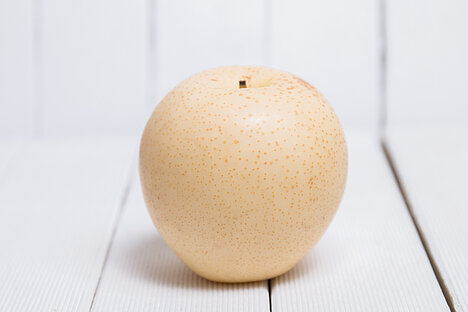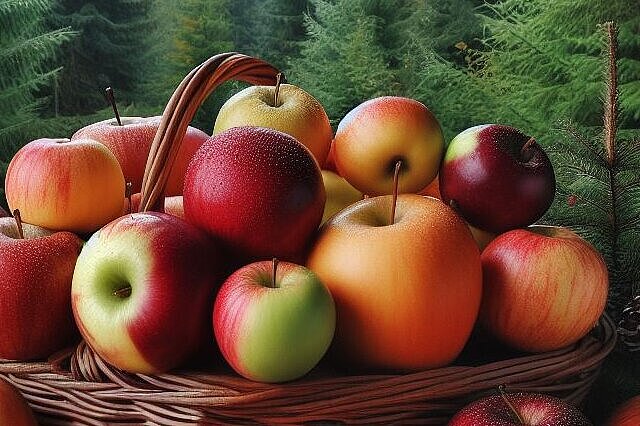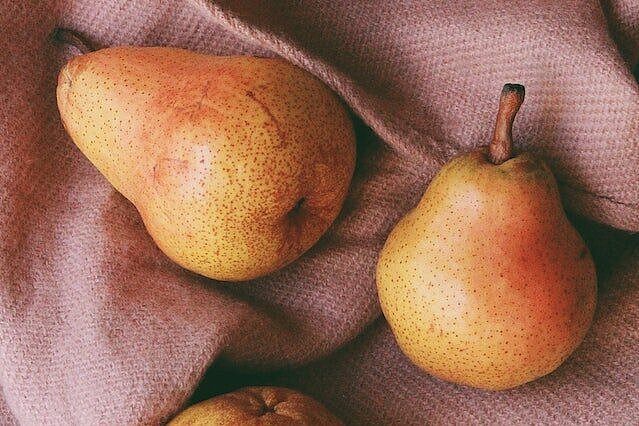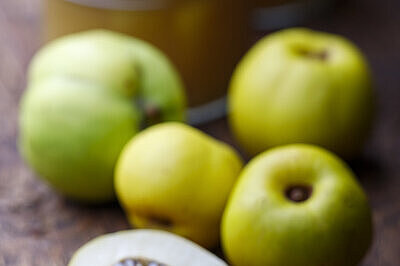Nashi pear

What is a Nashi pear?
A nashi pear is a type of fruit from the rose family. It originally comes from China, but is now widely grown throughout East Asia and Japan. The word "nashi" comes from the Japanese and means "pear", which is why the name "nashi pear" is actually a duplication.
The Nashi pear belongs to the same genus as the native cultivated pear (Pyrus communis), but forms its own group of varieties that originate from the Asian sand pear (Pyrus pyrifolia). There are over 100 varieties of Nashi pears, which can differ in shape, color and taste.
The fruits usually have a round or pear-shaped form and a smooth or slightly rough skin. The color varies from green to yellow to brown. The flesh is firm and grainy like an apple, but juicy and sweet like a pear. The seeds are small and inconspicuous.
How do you eat a nashi pear?
Nashi pears can be eaten raw or cooked. They can be peeled or eaten with the skin, depending on taste and variety. However, you should make sure that the fruit is ripe, otherwise it may taste woody or bland. You can recognize a ripe nashi pear by its soft skin and intense aroma.
Nashi pears can be enjoyed on their own or used as an ingredient in salads, cakes, jams or chutneys. It goes well with nuts, cheese or ham. In Asia, it is also often pickled or fermented.
What are the benefits of the Nashi pear?
Nashi pears have many benefits for your health and that of your dog. It contains a lot of water (approx. 88%) and fiber (approx. 3%), which is good for digestion. It also provides vitamin C (approx. 4 mg per 100 g), which strengthens the immune system. Other ingredients include potassium (approx. 121 mg per 100 g), which regulates blood pressure, and iron (approx. 0.12 mg per 100 g), which is important for blood formation.
The Nashi pear also has a low calorie content (approx. 42 kcal per 100 g) and a low glycemic index (GI), which means that it causes blood sugar levels to rise only slowly. This makes it an ideal snack for between meals or as part of a diet.
What are the disadvantages of the Nashi pear?
The disadvantages of nashi pears are rather minor and depend on individual tolerance. Some people or dogs may have an allergic reaction to the fruit or experience stomach problems if they eat too much of it. This is because the Nashi pear contains a lot of fructose (approx. 10 g per 100 g) and sorbitol (approx. 1 g per 100 g). Sorbitol is a sugar substitute that can cause flatulence or diarrhea in some people or dogs.
You should also make sure that the nashi pear is not contaminated with pesticides or other harmful substances. It is best to buy organically grown pears or wash them thoroughly before eating.
The nashi pear is a delicious and healthy fruit that you and your dog can enjoy without worrying. It has many benefits for your well-being and your diet. Only in rare cases can it lead to intolerances or discomfort. Give it a try and be surprised by its exotic taste!
Properties 1
Are you looking for other ingredients with a specific property?
Just click on them to find more.
If you notice any signs of hypersensitivity or poisoning in your dog, you should see your vet immediately. We are not a substitute for a vet, but we try to be as accurate as possible. Every dog reacts differently and we recommend you get a second opinion or consult your vet if in doubt.
Stay healthy and take good care of your four-legged friend!😊
Similar to Nashi pear
Apples are the fruit of the apple tree, which belongs to the rose family. There are many different varieties of apples, which differ in shape, color, taste and size. Apples consist mainly of water,...
Pears are fruit that grows from trees. There are many different varieties of pears, which differ in shape, color, taste and ripening time. Most pears are green, yellow or red and have a soft, juicy...
Quinces contain many healthy nutrients that are also good for dogs. These include potassium, zinc, iron, copper, manganese and fluorine. These minerals and trace elements are important for cell...
Persimmon is a tropical fruit that originates from Asia and is also known as sharon fruit or persimmon. It has an orange color and a round or oval shape. It tastes sweet and juicy and has a soft...



